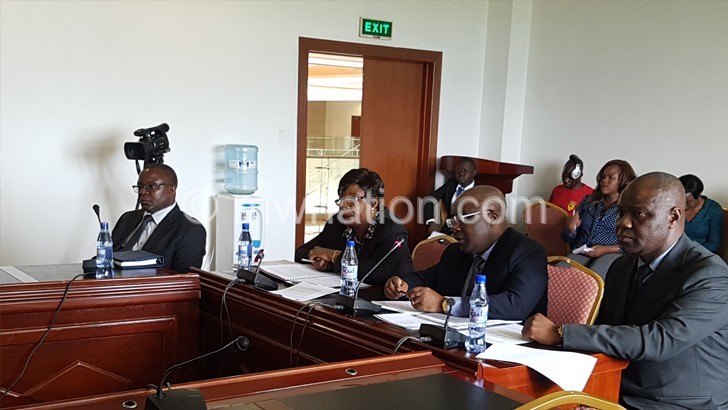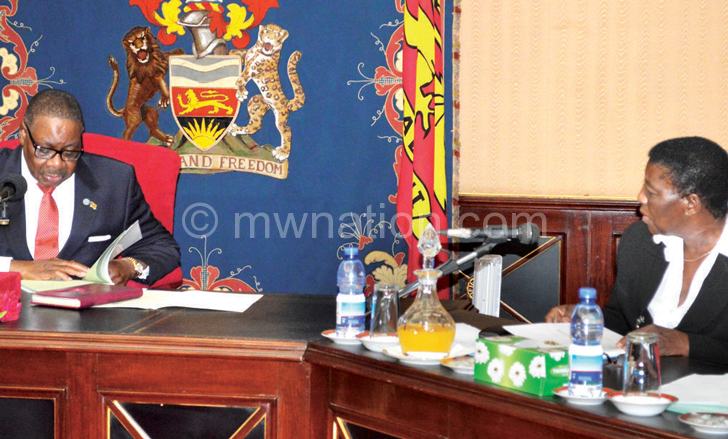Presidential Commission on ‘Maizegate’ releases damning report
Hardly a day after a Supreme Court ruling reinstated him as Minister of Agriculture, Irrigation and Water Development, George Chaponda yesterday found himself in a spot of bother again.
He now needs to be investigated by the Anti-Corruption Bureau (ACB) over his role in the involvement of a local firm, Transglobe, in Malawi’s questionable procurement of relief maize from Zambia.

The Zambian suppliers— Zambia Cooperative Federation (ZCF)—only delivered about 4 000 metric tonnes of maize of the full order of 100 000 metric tonnes to state produce marketer, the Agricultural Development and Marketing Corporation (Admarc).
The investigation is one of the key issues contained in a report presented yesterday to President Peter Mutharika at Kamuzu Palace in Lilongwe by the commission of inquiry that has been investigating the maize procurement from Zambia headed by retired Chief Justice Anastasia Msosa.
Says the report on Chaponda: “The commission finds the conduct of the minister, Hon. George Chaponda, in his dealings with Transglobe, a locally-registered company and trader of maize, most inappropriate, suspicious and raising issues of corrupt practices.”

In its recommendations, the report says, in part: “The dealings between the Minister of Agriculture, Hon. Dr. George Chaponda, MP, in this procurement process should be further investigated by the ACB as the manner in which Transglobe obtained an export permit from the Ministry of Agriculture of Zambia to supply maize to Admarc raises suspicion.”
In its findings, the commission describes two visits by Chaponda to Zambia as necessary ones. The first one was to hold negotiations with his counterpart to persuade the Zambia Government to allow the importation of maize by Malawi, while the second was as a special envoy to persuade the Zambian Government to lift a maize export ban that government had just imposed, it added.
However, the commission found that in the role as an envoy, Chaponda went beyond the two official mandates and bordered on interference with the procurement process.
Says the report: “First, the minister attempted to influence Admarc as to who should supply maize under the ZCF contract from the Zambian side.
The report notes that Chaponda personally asked Admarc to buy maize from Transglobe, a Malawian company with maize stocks in Chipata.
“This request was rejected by Admarc, which had signed a contract with ZCF. Admarc confirmed that Transglobe indeed approached them on several occasions on this matter. Secondly, the minister advised Transglobe to go and meet officials in the Ministry of Agriculture in Zambia to negotiate an export permit to supply part of the 100 000 metric tons of maize that was agreed in the contract between Admarc and ZCF,” adds the report.
Chronicling several questionable developments, the report says when Chaponda went to Zambia as a special envoy, a Tayub of Transglobe was also in Zambia meeting with officials in the Ministry of Agriculture.
The commission found two notable things about this development: the first being that the export ban was lifted and the second being that the Ministry of Agriculture in Zambia issued export licences to both ZCF and Transglobe, splitting the contract tonnage of 100 000 metric tonnes that was contracted between ZCF and Admarc in equal share of 50 000 metric tonnes with Transglobe.
“This development cannot be attributed to coincidence. It raises suspicion in relation to dealings between the minister and Transglobe. One can, therefore, not rule out the possibility of corrupt dealings between the two parties,” the report states.
It faults Admarc, in handling local and international maize procurement for a reported 6.5 million people who were feared to face hunger late last year and early this year, for flouting approval rules and systems, thereby causing discrepancies.
“The Ministry of Justice, as legal adviser to government, was completely bypassed. The commission considers these as reckless and inexcusable. In addition, the commission finds that certain conduct of Admarc officials in executing the ZCF contract amounts to fraud and exposes Admarc and ultimately Government to civil litigation,” it adds.
The commission, however, concludes that Admarc was grossly negligent in failing to negotiate a lower contract price for the purchase and delivery of maize under the ZCF contract, considering that the maize was to be sourced from Zambia’s Eastern Province, which is near Mchinji.
The committee recommends:
- That the Ministry of Agriculture, Irrigation and Water Development should improve on the way it conducts crop estimates, so that the findings of these surveys should not be misleading but facilitate government’s correct and effective response.
- That government must ensure that the strategic grain reserves under the custody of the National Food Reserve Agency (NFRA) should always be stocked with a minimum of 75 000 metric tonnes.
- That government should put in place mechanisms to prevent maize price fixing by a private traders’ cartel.
- That to the extent that procurement procedures were not followed and contracts were fraudulently entered into by Admarc management, the commission recommends that disciplinary proceedings should be instituted against senior management of Admarc.
- That Admarc must at all times ensure that corporate governance structures should be adhered to.





